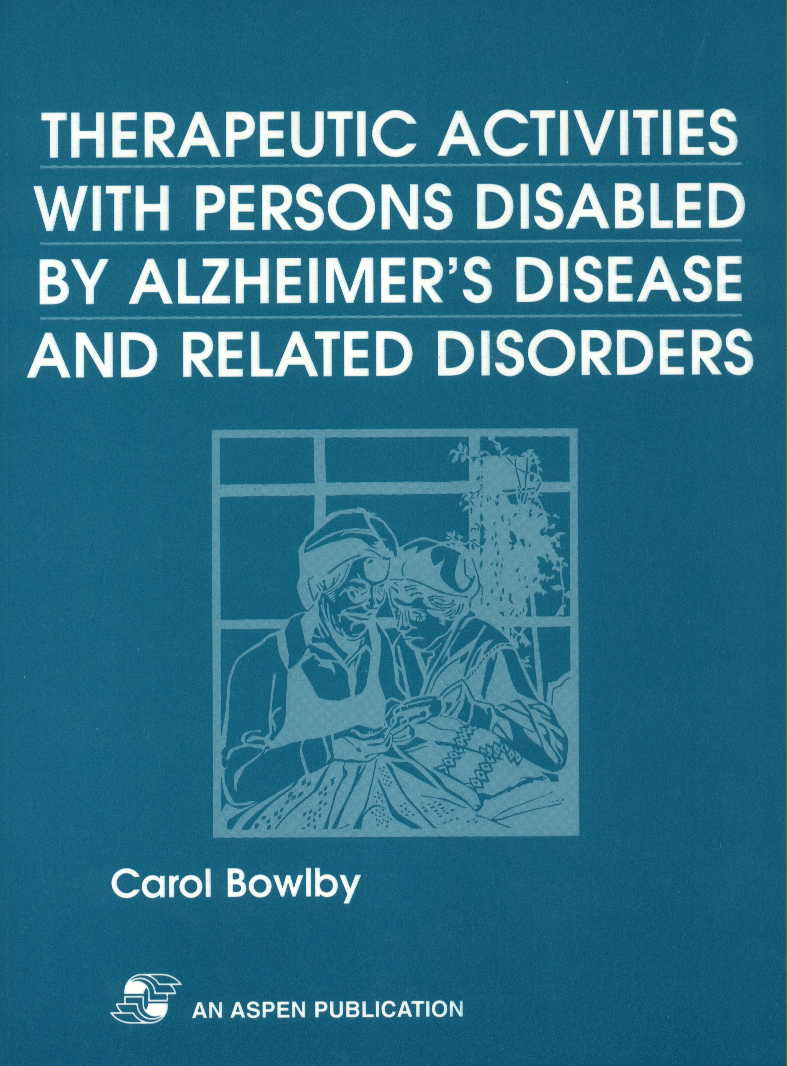 by Carol Bowlby, BA, BScOT, ODH
by Carol Bowlby, BA, BScOT, ODH
The focus of this book is on treatments for persons with Alzheimer's Disease and related Disorders, The broad goal of these treatments if to enable such individuals to accomplish their final life tasks, to affirm their personhood, to reaffirm the value of their pervious life experiences.
Full Description:
The focus of this book is on treatments for persons with Alzheimer's Disease and Related Disorders (ADRD) who require part-time or full-time residential care. The broad goal of these treatments is to enable such individuals to accomplish their final life tasks, to affirm their personhood, to reaffirm the value of their environment and to participate in their own care. The progression of the disease is inevitable, but with treatment the devastation of the individual's self-esteem and capacity to function can be lessened. The course of ADRD may run 15 or more years. In the absense of a cure, enhancing the quality of these years must be a priority for all caregivers - family, paid staff, and volunteers. Just as essential as quality physical care is quality emotional care. The treatments outlined in this book include practical approaches incorporated within daily activities, such as ways of structuring the conversation while assisting with morning dressing. There are also treatments that will help family visits be less stressful for family members and of great benefit to the affected relative. For activity specialists charged with the difficult task of engaging persons with ADRD in meaningful activities, there are guidelines for client assessment: activity analysis; planning and leading groups; basic and adapted techniques; and activities in the modalities of music, horticulture, pets, cooking, handicrafts, and other areas. In addition there are specific plans for yearlong sensory stimulation and reminiscence group activities. For all caregivers, there are guidelines for enabling independence, compensating for the sensory changes that accompany normal aging, and enhancing communication with persons with ADRD, as well as background information on ADRD and therapeutic models and methods. "As the disease progresses, there is little or no hope of recovery of memory, but people do not exist of memory alone. People have feelings, imagination, desires, drives, will and moral being. It is in these realms that there are ways to touch patients and let them touch us"
Cohen and Eisdorfer The Loss of Self
415 pages; 8 1/2 X 11;soft bound
Preface Acknowledgment Chapter 1 -- Normal Aging - Normal Aging and Alzheimer's Disease and Related Disorders(ADRD)
- What Does It Mean to Grow Old? Attitudes and Aging
- Describing "Normal" Aging
- Cognition
- The Special Senses
- Vision
- Hearing
- Olfaction (Sense of Smell)
- Taste
- Somatic ("Feeling") Sensations
- Vestibular Function
- Bones, Joints, and Skeletal Muscle
- Skin
- Sleep
- Neuromuscular Control
- Enabling Independence
- Conclusion
Chapter 2 -- Alzheimer's Disease and Related Disorders - What is Dementia?
- Alzheimer's Disease
- Causes of Alzheimer's Disease
- Other Irreversible Causes of Dementia
- Diagnosis of ADRD
- Persisting Assets of Individuals with ADRD
- Deficits of Individuals with ADRD
- Cognitive or Neurological Symptoms
- Physical Symptoms
- Impairments in Functional Ability
- Excess Disability Brought About By Outside Factors
- Why Treat Persons with ADRD?
Chapter 3 -- Communication - ADRD and Communication Problems
- Communication Skills Preserved
- Communication Losses
- Suggestions for Enhancing Verbal Communication
- Nonverbal Communication
- Gestures
- Personal Presentation
- Conclusion
Chapter 4 -- Group Work - Theoretical Models and Therapeutic Methods: Implications for Group Work
- Activity Theory
- Learned Helplessness
- Environmental Theories
- Reality Orientation
- Reminiscence
- Sensory Stimulation
- Behavioral Approaches
- Therapeutic Groups
- Guidelines for Leading Groups with Individuals with ADRD
- Selecting and Planning Activities
- Setting Goals
- The Group Milieu
- Activity Analysis
- Assessment: Selecting Group Members
- Challenging Behaviors
Chapter 5 -- Therapeutic Activities - Activities of Daily Living
- Food-Related Activities
- Handicrafts
- Horticultural Activities
- Intergenerational Activities
- Movement and Exercise
- Music
- The Therapeutic Use of Pets
- Spiritual Activities
- The Visual and Expressive Arts
- General Activity Resources
Appendix 5-A -- RecipesAppendix 5-B -- Suggested Handicraft ActivitiesAppendix 5-C -- Horticultural ActivitiesChapter 6 -- Reminiscence Groups - Introduction: What is Reminiscence?
- Empirical Research on Reminiscence
- The Reminiscence Group
- The Reminiscence Group: Putting It Into Practice
Appendix 6-A -- Resource GuidesChapter 7 -- Sensory Stimulation - Intoduction: Mr. D. and the Pumpkin
- The Theory Behind Sensory Stimulation
- Research Evidence: Sounds Good, But Does It Really Work?
- The Sensory Stimulation Group
- Specific Cues for Each Sense
- Sensory Stimulation Group Format
- Eating Stimulation: A Variation of Sensory Stimulation
- Conclusion
- Resources
Appendix 7-A -- Thematic Calendar and Sensory Stimulation Theme ChartsChapter 8 -- Administrative and Fiscal Issues - Purpose for Inclusion in a Practice Manual
- Ethical and Philosophical Basis for Offering Services to Persons with ADRD
- Differences in Canadian and American Health Care Systems: Provision of Services for the Elderly
- Systems Analysis: A Framework for Planning, Directing, and Implementing Services
- Financial and Reimbursement Issues
- Annotated Bibliography
Bibliography Suggested Reading Index
Stock- Ususally ships in 5-8 days!
|